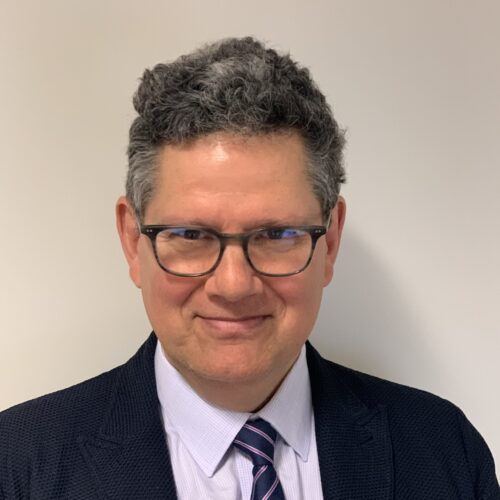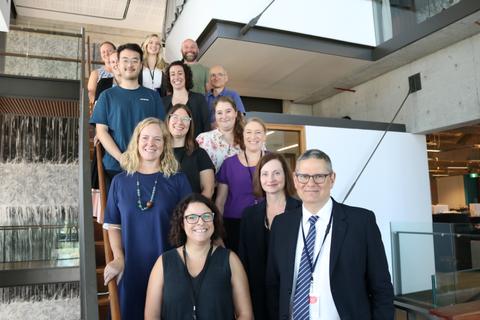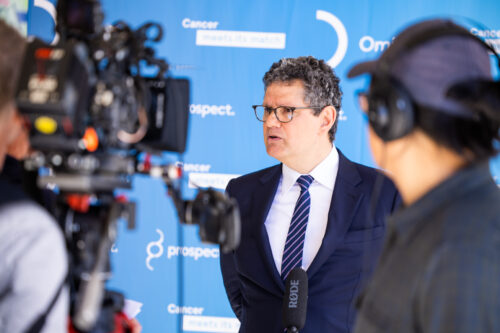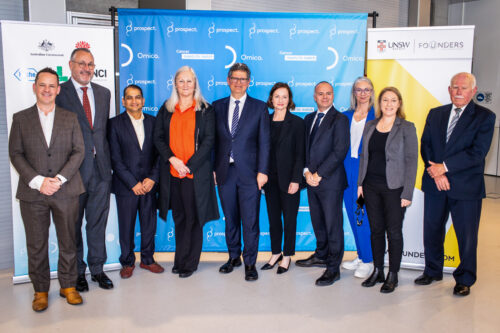Nothing defines the unique character of George Clinical more than the people who do the important work of researching treatments and clinical practices that will shape medical policies and practices in every corner of the world. While our Scientific Leadership Team members are a diverse group from many countries and therapeutic areas, one thing they all share is a passion for making an impact on the treatment, and thus the lives, of the patients they serve. These are their stories.

Professor Thomas’ research focus is on the application of genomic technologies to the understanding and management of cancer. He is the inaugural Director, Centre for Molecular Oncology, University of New South Wales; Head of the Genomic Cancer Medicine Laboratory, Garvan Institute of Medical Research; and CEO of Omico. He founded the Australasian Sarcoma Study Group and established Australia’s leading adolescent and young adult cancer unit at the Peter MacCallum Cancer Centre. Professor Thomas leads the International Sarcoma Kindred Study and led the first international study of denosumab in Giant Cell Tumor of bone, leading to FDA and TGA approval.
As a young person I enjoyed reading and understanding about people and society, and I acquired a sense of responsibility. I started out studying arts at university because I loved reading English literature. But I soon came to the conclusion that it was one thing to read about people, and it’s another thing to actually help them — to be useful. So I went into medicine. I thought — and still think — it is necessary to consider how my career might have an impact on social well-being.
I became increasingly fascinated with humans from a physiological and pathophysiological perspective, and by my middle twenties, I decided to become a physician and to understand internal medicine as well as I could. During rotations, I particularly enjoyed my time in oncology and palliative care. I thought of cancer as a kind of crisis to which human beings have to react. To become an oncologist would allow me to participate — not merely be an observer — in those critical moments in people’s lives. I consider that to be a great privilege.
The next fascination was with molecular cell biology which led to a deep passion for biomedical research, and though I had little time to spare, I can visibly remember going into the basement and searching medical records for data that was relevant to the patients I was managing. I had a curiosity that led me to Harvard Medical School where a brilliant scientist called Phil Hinds challenged me to understand the role of a particular tumor suppressor in bone cancer. After working at the Peter McCallum Cancer Centre back in Australia, in 2008 I set up what is the largest sarcoma cohort worldwide that is now paying enormous dividends as genomics has developed to the point of influencing rational drug development.
Over the past 12-15 years I’ve been progressively setting up a national precision oncology structure in Australia — partly around the idea that in rare diseases like sarcomas, only molecular profiling is going to allow us to personalize treatments. Outside of that, the numbers are so low that it is unlikely that we will ever make any progress.
So that’s essentially the short version of the story of how I got where I am today.
What you’re describing is the twin drivers of any successful enterprise, especially in research. The first is to have an inexhaustible appetite for curiosity and a deep pleasure from satisfying that curiosity. But there’s no point in having curiosity unless you can create the resources to be able to satisfy it. So you acquire the skills that enable you to achieve those goals. That involves doing the right and good experiments and doing them effectively. But it also involves more systematic challenges like raising funds. And the secret to raising funds is to ask important questions that are unlikely to go away — will not become obsolete.
You have to think about the problems that society faces from a social, human perspective because that’s also the perspective of the funding agencies. What are the needs and the priorities of the health system itself? So in the case of Omico, we were offering a solution to an element of the health system that needs to be changed in order to realize the benefits that science has already delivered.
For example, in non small cell lung cancer, there are now at least 10 biomarkers for which there are very good drugs with proven efficacy. And yet in Australia we only recently gained routine access to the molecular profiling that will enable us to choose those drugs, and we don’t have access in a reimbursed way to all those drugs which actually produce the benefits.
The mission of Omico is to provide a no-cost access to molecular screening — looking at the DNA of cancer and other molecules — and to match people with rare, advanced, difficult-to-treat or early-onset cancers to existing treatments or clinical trials researching innovative new drugs. Essentially we are making hope meet possibilities. Omico is a unique structure of a government-backed not-for-profit collaboration between researchers, clinicians and industry partners.
Both our mission and our structure responded to a need in Australia’s healthcare system. Because we are a not-for-profit company, we can operate nationally at the patient interfaces. That’s important in Australia because we are actually eight separate states and territories with individual governments and healthcare systems — so that was an attractive proposition for the federal government when it came to funding us with 62 million $AUS. Omico offers a way to change the national healthcare system without having to work with eight separate systems individually.
The state government of New South Wales has also chipped in because it’s the hub of this national network. It saw its own interest in investing another $25 million. The rest has come from a variety of sources, including from industry itself, which is contributing not only dollars to make the program a reality, but also is committed to bringing in more trials into the country, which, of course, we also need to be able to treat patients.
We can also negotiate in a commercially realistic and nimble fashion with industry partners, which governments struggle to do. Omico has developed all sorts of very productive partnerships across a broad range in the pharmaceutical and biotech sectors that will enable us to deliver the trials — and therefore the treatments — that our patients need, and to do so in a way that, as a not-for-profit, still reflects the public interest.
So basically Omico is meeting both the economic and logistical challenges to unlocking the potential of precision oncology for cancer patients. In this era of biomarker-dependent drug development, novel and more efficient approaches to genomic profiling have the potential to revolutionize clinical trial access for both patients and clinicians. And working with CROs like George Clinical can help overcome operational barriers faced by oncology trials and help clinicians and cancer centers target the right patients for the right trials.
We offered a solution to a problem that isn’t going away that bypassed some of the impediments the government faced and that was attractive. So when you ask the right questions — offer the right solution — you are most likely to get your resources.
 How is Omico’s system of connecting the silos within the healthcare system working out?
How is Omico’s system of connecting the silos within the healthcare system working out? There are now 10,000 people who have been through molecular screening, and we are currently preparing a paper on the first 3,000 of those patients. We can show that there’s an incredibly high frequency of these — more than one third — with good drug targets. This is a population that has little or no treatment option with a median survival of 8-10 months. For those screened patients who had access to their drug targets, survival was doubled to 18-20 months. So if we can just get access to the right drug targets for every patient screened, we will have a huge impact on the population as a whole.
Cancer at an individual level is the most common health-related tragedy that kills us in higher income countries today. The heat comes from the tragedy. But the light comes from the solution and the solution comes from science. Science sheds light on the nature of the problem and allows us to develop effective solutions that address the heat and pain of the tragedy.
Precision medicine, genomics and rational drug development are the solution to the tragedy of incurable cancers. And it’s not just limited to molecular therapeutics. It also relates to the use of genomics to understand why people get cancers and potentially to personalize risk management as well as personalized therapy. We’re in an era where we have the opportunity to implement solutions that will improve health outcomes for cancer patients. And that’s the light element to the heat.
 Why is Australia the right place for cancer research?
Why is Australia the right place for cancer research?Well, that’s easy. We have a first-rate healthcare system with the best five-year survival for cancer in the world at 70%. Our healthcare system delivers first-rate outcomes. And there are also very good tax incentives for doing clinical trials in Australia. Now, thanks to Omico, we have a population-scale molecular screening infrastructure that enables biomarker dependent drug development trials in a way that has not been possible previously. Those trials can happen, conservatively, twice as fast as would be possible without having a molecular screening infrastructure. And of course Australian data is widely accepted by both European and US drug agencies for regulatory filings.
I like playing chess. I’m an online chess addict. I’m not particularly good at it — I should make sure that’s clear — but I very much enjoy it. And I also enjoy playing classical guitar. My favorite composer is Bach. Also, we have a mountain cottage which I like to spend as much time at as I possibly can.
2023 ASCO Celebrates Patients at the Cornerstone of Cancer Care and Research